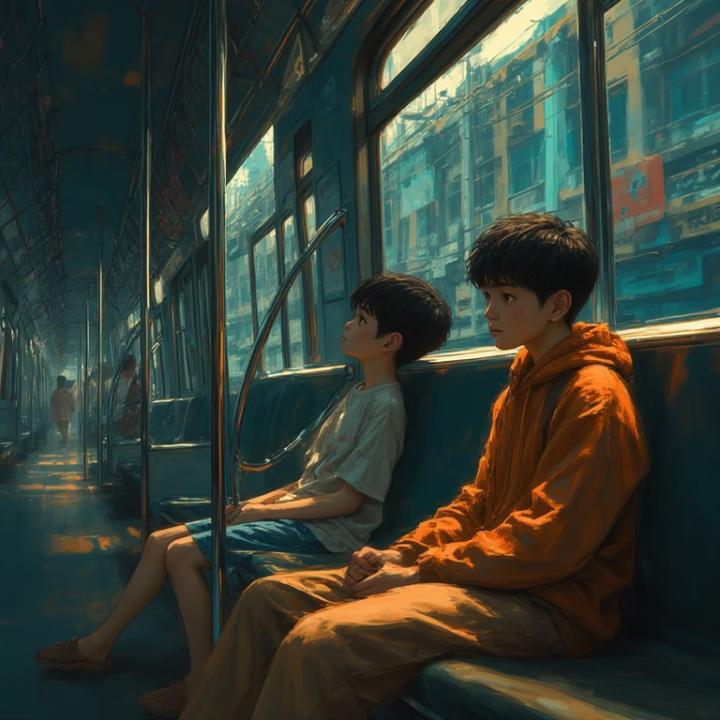
The last train on the Kelana Jaya Line shivered to life at 11:47 p.m., its doors sighing shut like a tired breath. Eddy stepped in, shoulders hunched beneath a threadbare hoodie, his reflection ghosting across the darkened windows. At fifteen, he had already mastered the art of invisibility—slipping through school corridors like a rumor, speaking only when spoken to, vanishing into the hum of the city before anyone could notice he was gone.
Tonight, like most nights, he boarded alone.
The train rattled forward, lights flickering overhead, casting long shadows down the empty car. Eddy slumped into a seat near the back, headphones dangling unused around his neck. He didn’t play music anymore. Not since his mother passed. Her voice had been his favorite song—soft, smoky, always humming old dondang sayang tunes while she rolled dough for kuih lapis in their tiny kitchen. Now silence felt safer. Safer than missing her. Safer than remembering.
But as the train curved beneath the heart of Kuala Lumpur, something shifted.
A whisper curled through the air—not from the speakers, not from another passenger—but from the train itself. A murmur, low and warm, like steam rising from a street vendor’s wok.
“Sampai dua puluh sen, satu roti canai…”
Eddy froze.
The voice was old, cracked with years, unmistakably that of a man who had spent a lifetime shouting over traffic at a roadside stall. Then another voice, softer, a woman’s: “Hujan turun lebat, sayang… jangan lama-lama di pasar.”
And then—a sound like wooden wheels on wet stone. A creak-creak-creak, fading into a sigh.
The MRT car was singing.
Not with music. With memory.
Eddy leaned forward, heart thudding. The lights dimmed, then glowed a honeyed amber, as if the train had slipped into a different time. The seats shimmered—just for a second—into wooden benches. The floor became packed earth. And through the windows, instead of tunnels, he saw kampung lanes slick with monsoon rain, a gerai glowing under a tarp, a man pedaling a rickshaw with a laughing child bundled in a plastic poncho.
A voice, deep and rhythmic, rose from the walls: “I drove this route for thirty-two years. From Jalan Sultan to Chow Kit. I knew every bump, every cry in the night. The city forgot me, but the wheels remember.”
Eddy exhaled. “You’re… remembering?”
The train didn’t answer with words. Instead, it played a song—not notes, but stories. A hawker woman bargaining with a policeman. A boy singing while he swept a temple floor. A love letter read aloud under a flickering streetlamp. Each voice rose like smoke from the metal bones of the carriage, layering into a chorus of lives once lived, now nearly lost.
Tears pricked Eddy’s eyes.
Because he recognized one of them.
“Someday, my boy, you’ll taste the world,” his mother’s voice whispered from the ceiling vent. “But always come back to flavor. To memory. To home.”
He hadn’t heard her voice in over a year.
“Mom?” he breathed.
The train slowed. The lights returned to sterile white. The visions faded. But the warmth remained, pooling in his chest like tea from a shared cup.
At the next stop—Pasar Seni—the doors opened to an empty platform. No signs of life. Yet the air smelled of ikan bakar and frangipani.
A final voice, gentle as a lullaby, echoed through the cabin.
“We are not gone. We are only waiting to be heard.”
The doors closed. The train moved on.
When Eddy stepped out at Kelana Jaya, dawn was bleeding gold over the skyline. He didn’t go straight home. Instead, he walked to the old night market, where a young vendor struggled to flip a roti canai without breaking it.
“Need help?” Eddy asked.
The vendor blinked. “You know how?”
Eddy smiled—small, quiet, but real. “My mother taught me.”
And as he took the dough, as he flung it gently into the air like a prayer, the breeze carried a whisper from the distant rails—singing, still, beneath the city’s breath.
For the first time in a long time, Eddy didn’t feel alone.
He felt remembered.
And that was enough.










